STEREO's Routes to Solar Orbits
|
|
The two STEREO spacecraft, A (red path) and B (yellow path), are launched from the Earth into a highly eccentric orbit with an apogee that reaches the orbit of the Moon. Once in this orbit, the trajectories are adjusted so they can receive gravity-assists from the Moon. The gravity assist will send them both into heliocentric orbits, one spacecraft ahead of the Earth and the other behind the Earth. This trajectory was generated using a spacecraft ephemeris generated shortly after launch.
|
|

|
|
This movie illustrates the lunar gravity assist that sends the STEREO spacecraft into their heliocentric orbit. This version has date labels.
Duration: 51.0 seconds
Available formats:
320x240 (30 fps)
MPEG-1
4 MB
640x480 (30 fps)
MPEG-1
12 MB
720x480 (30 fps)
MPEG-2
13 MB
720x486 (29.97 fps)
Frames (Date)
320x240
JPEG
10 KB
How to play our movies
|
|
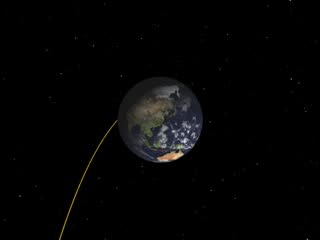
|
|
This movie illustrates the lunar gravity assist that sends the STEREO spacecraft into their heliocentric orbit. This version does not have date labels.
Duration: 51.0 seconds
Available formats:
320x240 (60 fps)
MPEG-1
3 MB
640x480 (60 fps)
MPEG-1
10 MB
720x480 (60 fps)
MPEG-2
11 MB
720x486 (29.97 fps)
Frames (Nodate)
320x240
JPEG
8 KB
How to play our movies
|
|
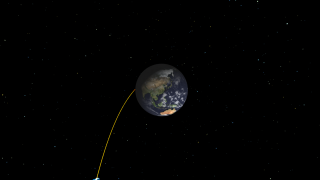
|
|
This movie has a slightly altered camera path and rendered in Left/Right eye pairs for stereo projection.
Duration: 45.0 seconds
Available formats:
1280x720 (29.97 fps)
Frames (Lefteye)
1280x720 (29.97 fps)
Frames (Righteye)
1280x720 (30 fps)
MPEG-4
6 MB
320x180
PNG
24 KB
How to play our movies
|
|
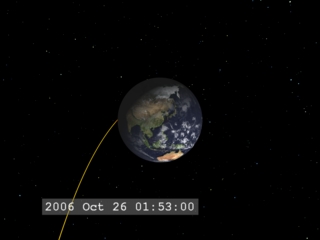
|
|
STEREO A and B speed away from the Earth. Currently their trajectories are too close together to distinguish as separate spacecraft.
Available formats:
2560 x 1920
TIFF
985 KB
320 x 240
JPEG
20 KB
|
|
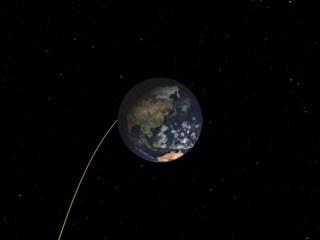
|
|
STEREO A and B speed away from the Earth. Currently their trajectories are too close together to distinguish as separate spacecraft. This version has no date information.
Available formats:
2560 x 1920
TIFF
784 KB
320 x 240
JPEG
18 KB
|
|
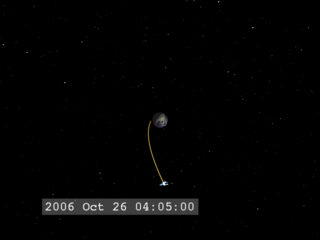
|
|
The spacecraft leave the Earth behind.
Available formats:
2560 x 1920
TIFF
380 KB
320 x 240
JPEG
14 KB
|
|
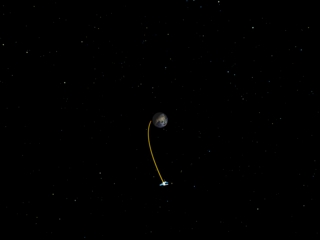
|
|
The spacecraft leave the Earth behind. This is the 'no date' version.
Available formats:
2560 x 1920
TIFF
176 KB
320 x 240
JPEG
12 KB
|
|
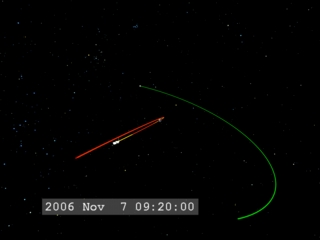
|
|
The spacecraft pass apogee, at the orbit of the Moon. The Moon and it's orbit are represented by the white sphere and green curve.
Available formats:
2560 x 1920
TIFF
413 KB
320 x 240
JPEG
22 KB
|
|
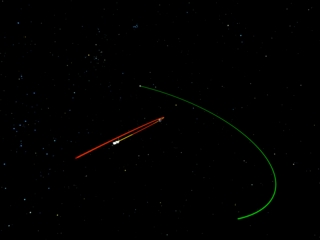
|
|
The spacecraft pass apogee, at the orbit of the Moon. The Moon and it's orbit are represented by the white sphere and green curve. This is the 'no date' version.
Available formats:
2560 x 1920
TIFF
214 KB
320 x 240
JPEG
20 KB
|
|
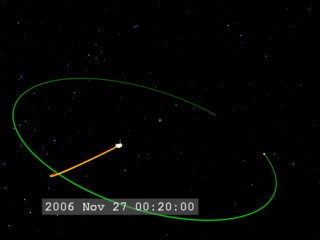
|
|
STEREO continues in geocentric orbit, waiting for the Moon to reach the optimum position.
Available formats:
2560 x 1920
TIFF
432 KB
320 x 240
JPEG
25 KB
|
|
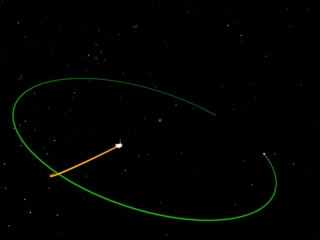
|
|
STEREO continues in geocentric orbit, waiting for the Moon to reach the optimum position. This is the 'no date' version.
Available formats:
2560 x 1920
TIFF
229 KB
320 x 240
JPEG
23 KB
|
|
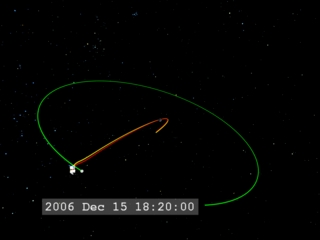
|
|
As the Moon passes, STEREO moves behind, receiving a gravitational nudge which increases its speed.
Available formats:
2560 x 1920
TIFF
425 KB
320 x 240
JPEG
24 KB
|
|
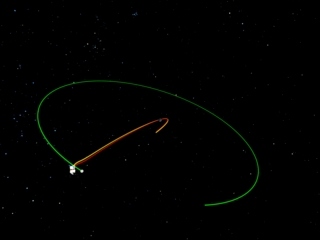
|
|
As the Moon passes, STEREO moves behind, receiving a gravitational nudge which increases its speed. This is the 'no date' version.
Available formats:
2560 x 1920
TIFF
226 KB
320 x 240
JPEG
22 KB
|
|
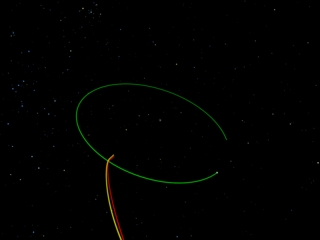
|
|
The spacecraft move out from the Earth-Moon system. This is the 'no date' version.
Available formats:
2560 x 1920
TIFF
207 KB
320 x 240
JPEG
20 KB
|
|
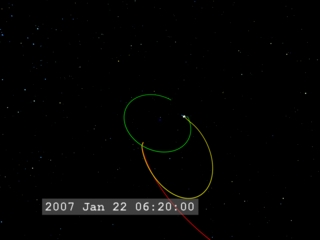
|
|
While STEREO A continues outward, STEREO B doesn't have quite enough speed and curves back Earthward, receiving an extra boost from the Moon.
Available formats:
2560 x 1920
TIFF
393 KB
320 x 240
JPEG
20 KB
|
|
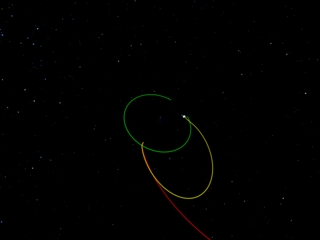
|
|
While STEREO A continues outward, STEREO B doesn't have quite enough speed and curves back Earthward, receiving an extra boost from the Moon. This is the 'no date' version.
Available formats:
2560 x 1920
TIFF
191 KB
320 x 240
JPEG
17 KB
160 x 80
PNG
2 KB
80 x 40
PNG
1 KB
|
|
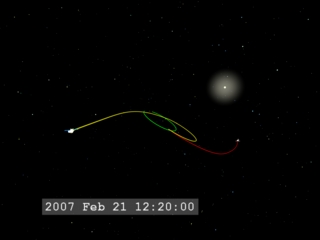
|
|
Relative to the Earth, STEREO A appears to move towards the Sun while STEREO B moves away from the Sun. The Sun moves into the field of view.
Available formats:
2560 x 1920
TIFF
440 KB
320 x 240
JPEG
17 KB
|
|
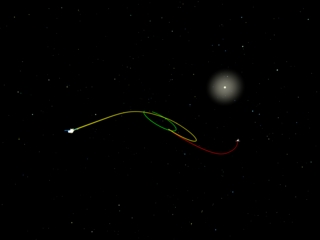
|
|
Relative to the Earth, STEREO A appears to move towards the Sun while STEREO B moves away from the Sun. The Sun moves into the field of view. This is the 'no date' version.
Available formats:
2560 x 1920
TIFF
242 KB
320 x 240
JPEG
14 KB
|
|
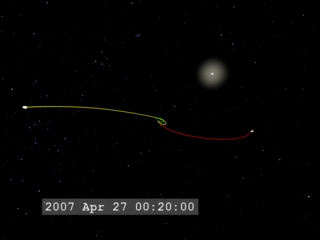
|
|
By April, 2007, the two STEREO spacecraft have left the Earth and Moon far behind.
Available formats:
2560 x 1920
TIFF
448 KB
320 x 240
JPEG
20 KB
|
|
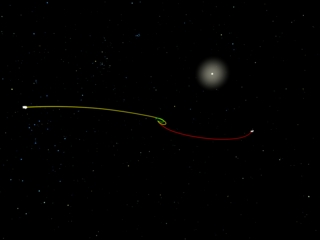
|
|
By April, 2007, the two STEREO spacecraft have left the Earth and Moon far behind. This is the 'no date' version.
Available formats:
2560 x 1920
TIFF
249 KB
320 x 240
JPEG
18 KB
|
|
|
Back to Top
|